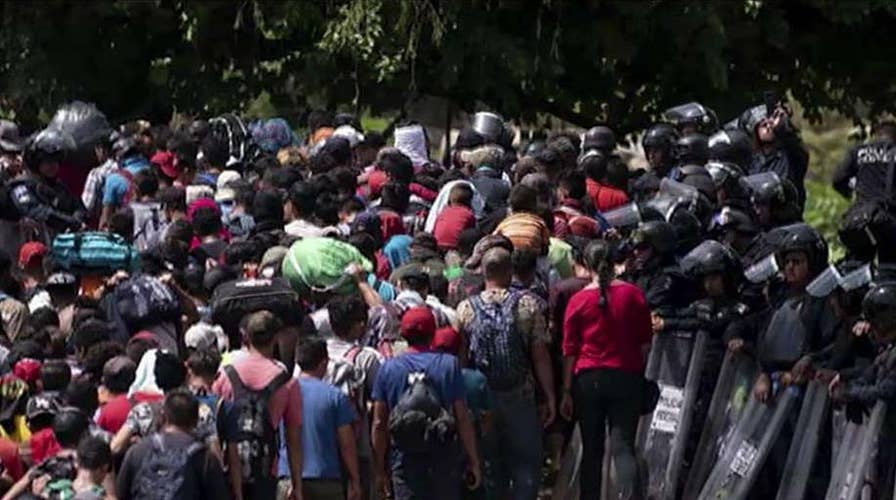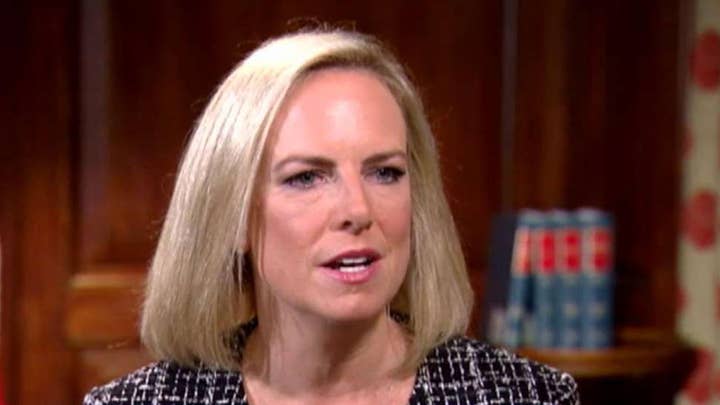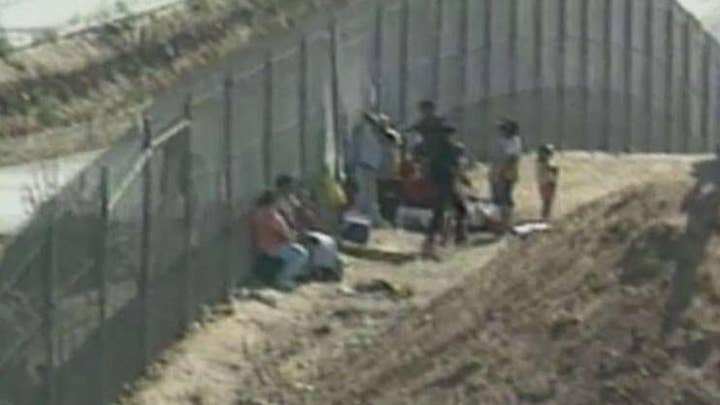Trump administration tightens immigration asylum rules
As the migrant caravan approaches the U.S. border, the president issues emergency national powers to limit the number of asylum claims; Trace Gallagher details the new policy.
The Trump administration announced Thursday that migrants who attempt to cross the U.S.-Mexico border illegally will not be eligible to claim asylum under a new rule meant to crack down on "meritless" claims.
The rule, which prevents migrants from claiming asylum if they do not do so at an official border crossing, is the latest attempt by the White House to handle a surge in migration to the U.S. from the Central American countries of Guatemala, Honduras and El Salvador.
President Trump is expected to formally enact the rule in a presidential proclamation Friday and will invoke the same powers he used to push through a version of the travel ban that was upheld by the Supreme Court, according to senior administration officials.
"Consistent with our immigration laws, the President has the broad authority to suspend or restrict the entry of aliens into the United States if he determines it to be in the national interest to do so," Acting Attorney General Matt Whitaker and Homeland Security Secretary Kirstjen Nielsen said in a joint statement. " ... Our asylum system is overwhelmed with too many meritless asylum claims from aliens who place a tremendous burden on our resources, preventing us from being able to expeditiously grant asylum to those who truly deserve it. Today, we are using the authority granted to us by Congress to bar aliens who violate a Presidential suspension of entry or other restriction from asylum eligibility.”
The announcement was the latest push to enforce Trump's hard-line stance on immigration through regulatory changes and presidential orders, bypassing Congress. But those efforts have been largely thwarted by legal challenges and, in the case of family separations this year, stymied by a global outcry that prompted Trump to scrap them.
A senior administration official said the White House hopes that by funneling asylum claimants to ports of entry, officials will be able to assess and adjudicate the claims more rapidly. The official did not say where asylum-seekers would be housed should they arrive at those ports of entry in large numbers. The official added that the rule was not retroactive and only covers future asylum claimants.
Migrants who cross illegally are generally arrested and often seek asylum or some other form of protection. Claims have spiked in recent years, and there is a backlog of more than 800,000 cases pending in immigration court. Generally, only about 20 percent of applicants are approved.
According to DHS, the department has seen a 2,000 percent increase since 2013 in migrants claiming that they have "credible fear" of persecution should they return to their home country. In 2017, the U.S. fielded more than 330,000 asylum claims, nearly double the number two years earlier and surpassing Germany as highest in the world.
A senior administration official said Thursday that the vast majority of such claims are "non-meritorious."
Administration officials said those denied asylum under the proclamation may be eligible for similar forms of protection if they fear returning to their countries, though they would be subject to a tougher threshold. Those forms of protection include "withholding of removal" -- which is similar to asylum, but doesn't allow for green cards or bringing families -- or asylum under the United Nations Convention Against Torture.
The rule change is likely to be challenged in court. Omar Jadwat, director of the American Civil Liberties Union's Immigrants' Rights Project, said they were clearly illegal.
"U.S. law specifically allows individuals to apply for asylum whether or not they are at a port of entry. It is illegal to circumvent that by agency or presidential decree," he said.
The asylum section of the Immigration and Nationality Act says a migrant is allowed to make a claim up to a year after arriving in the U.S., and it doesn't matter how they arrive -- illegally or through a border crossing.
Curbing immigration has been a signature issue for Trump, who pushed it hard in the days leading up to Tuesday's midterm elections, railing against caravans of Central American migrants that are still hundreds of miles from the border.
As of Thursday, there are more than 5,600 U.S. troops deployed to the border mission, with about 550 actually working on the border in Texas. The military is expected to have the vast majority of the more than 7,000 troops planned for the mission deployed by Monday, and that number could grow.
Trump has also suggested he'd revoke the right to citizenship for babies born to non-U.S. citizens on American soil and erect massive "tent cities" to detain migrants. Those issues were not addressed by the regulations Thursday.
The administration has long said immigration officials are drowning in asylum cases partly because people falsely claim asylum and then live in the U.S. with work permits. Trump has long said those seeking asylum should come through legal ports of entry. But many migrants are unaware of that guidance, and official border crossings have grown clogged.
Officials have turned away asylum seekers at border crossings because of overcrowding, telling them to return later. Backlogs have become especially bad in recent months at crossings in California, Arizona and Texas, with some people waiting five weeks to try to claim asylum at San Diego's main crossing.
It's unclear how many people en route to the U.S. will even make it to the border. About 4,800 migrants are sheltered in a sports complex in Mexico City, some 600 miles from the U.S. border. Several smaller groups were trailing hundreds of miles to the south; officials estimated about 7,000 in all were in the country in the caravans. The migrants are largely poor people and many say they're fleeing violence; more than 1,700 were children under 18, and more than 300 were children under age 5.
Fox News' Jake Gibson and Kelly Chernenkoff and The Associated Press contributed to this report.
















































